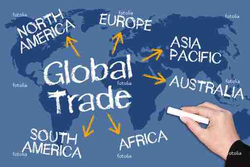 An economy is called “open” if it conducts a significant amount of business (trade) with other countries – and this trade can be in physical goods or services. There is a popular misconception that by reducing imports and supporting local production, jobs will be created locally, thus increasing a country’s economy, as measured by gross domestic product (GDP). But such a policy would only lead to a downward spiral in the economy – we only have to look at the crushing impact of sanctions on the South African economy in the late 1980s and early 1990s when the country suffered a protracted recession, declining by more than 3% (annualised) at one stage. To get an idea of the impact of economic isolation, let’s take an extreme example: let’s imagine an economy of one person. Imagine that each individual opted to produce everything they required entirely by themselves. This would include producing one’s own food, the utensils to cook that food, the stove on which to cook it, and so on. Imagine having to produce your own clothing, your own car, your own home, your own medication – anything at all that you require to enjoy the lifestyle that you do. Clearly, we would spend most of our days just producing the basics for survival – and we would have an appalling standard of living and a dismal lifestyle. Thank goodness we don’t have to do that. Rather, we each specialise in producing something that we are good at and that is reflected in the salary that we earn – so we seek out the best salary that we can get. We then engage in trade as an individual – we sell our skills and we use the income to buy those things that we can’t produce as efficiently. The larger the base within which we can trade, the greater the choice of goods and services we have available to purchase – and the better their prices. The larger the base within which we can sell our services (as a human resource) the better the price (salary/wages) we can get for our efforts. Now let’s look at this from the point of view of a country. The more that a country trades with other nations, the GREATER the standard of living it can enjoy. By focusing on producing what it can produce more efficiently than other countries, and then trading with other states, everybody can be better off. China has proved this by becoming a manufacturing hub. Since liberalizing its economy in the late 1970s, the Chinese economy has enjoyed one on the most spectacular and enviable increases, taking the nation from the low-income category to its current middle-income status. India has become a significant developer of software, taking that country into increasingly higher salary bands. South Africa has exceptional capabilities in several areas and it is these which we need to develop and exploit as much as possible. This will provide the necessary income to import those things which we cannot manufacture as competitively and, thus, benefit from having more. Some of the areas where I think we should focus on are tourism in general, but also medical and sports tourism, the film industry and call-centre services. There is also need no reason why South Africa should not become the Financial-Services hub of Africa. The same applies to aviation maintenance and repair services. What industries do you think South Africa should opt to build and develop?
0 Comments
|
Hot off the press
Economist, data translator, communicator and fascinated by the world around us. Archives
December 2023
Categories
All
|
 RSS Feed
RSS Feed